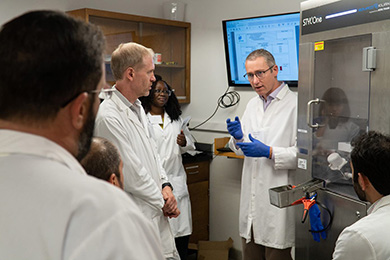Register to attend a Tablets and Capsules Hands-On Short Course at the University of Maryland School of Pharmacy.
 Upcoming Course Dates:
Upcoming Course Dates:
October 13-17, 2025
About the Course:
The Tablets and Capsules Hands-On Short Course at the University of Maryland School of Pharmacy uses lectures and hands-on laboratory sessions to provide an overview of the manufacturing of multiparticulate beads, capsules, and tablets. It is designed to take students from raw material assessment and formulation development, through the key unit operations of tablet and capsule manufacturing, all the way to end-product testing and quality control using PAT methods. Going through the entire manufacturing process from start to finish in a systematic way will give students a comprehensive understanding of tablet and capsule manufacturing.
In addition, lecture material is emphasized by comprehensive labs in which the unit operations discussed include: milling, mixing, granulation, spray drying, compression, encapsulation, and coating. The course also covers formulation strategies and offers a detailed discussion about the major excipient classes, such as filler binders, lubricants, and disintegrants.
Course Objectives:
By the end of the course, students will be able to:
- Develop a basic tablet and capsule formulation and be able to describe the role of each excipient in the formulation
- Set up and operate a tablet press and capsule filling machine
- Granulate a powder using wet and dry methods
- Coat a tablet or multiparticulate bead
- For the unit operations studied, identify the key variables that controls the product quality
- Understand the basics of setting up a PAT quality control system
- Explain the concepts of QbD, process validation, product evaluation, and FDA regulatory requirements
- Develop new contacts with faculty and colleagues
Who Should Attend:
This course is an introduction to tablet and capsule manufacturing from beginning to end, and emphasizes hands-on, practical learning through extensive laboratory exercises. It is designed for industrial researchers who work in formulation development, process development, quality control, and administration. It is also ideal for FDA regulators who work in CMC review, as well as FDA labs involved in product quality evaluation.
For More Information:
More information, including registration, course outline, partners, speakers, accommodations, as well as information about Baltimore can be found on this website.
